|
|
|
Sort Order |
|
|
|
Items / Page
|
|
|
|
|
|
|
| Srl | Item |
| 1 |
ID:
174839
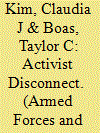

|
|
|
|
|
| Summary/Abstract |
Do activists seeking to challenge the U.S. military presence overseas succeed in persuading the local population? While the comparative literature on base contestation often makes implicit causal claims about public opinion and behavior, these claims have never been tested empirically using individual-level data. Based on an online survey, experiment with residents of communities hosting U.S. military bases in Korea and Japan, we demonstrate a disconnect between anti-base movements and local residents. Local public opinion is most responsive to pragmatic framing of opposition by social movements and tangible information about the consequences of base expansion. Other common activist tactics have little effect and may even backfire. Our findings fill an important gap in the growing literature on the politics of U.S. military bases abroad.
|
|
|
|
|
|
|
|
|
|
|
|
|
|
|
|
| 2 |
ID:
174831
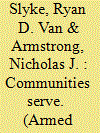

|
|
|
|
|
| Summary/Abstract |
Military veterans and their families face a multiplicity of challenges once they transition from service. Even though more American private and public-sector organizations are engaged in studying the needs of veterans and their families through need assessments, few assessments are comprehensive analyses of the challenges they face. This systematic review of 61 need assessments from 2007-2018 in the United States summarizes findings on 18 veterans issues. While most studies addressed issues relating to accessing U.S. Department of Veterans Affairs health and benefit services, mental health, employment, and homelessness, gaps in the literature emerged, particularly regarding ethnic and sexual minority, rural and elderly veterans, and National Guard/Reserve servicemembers. Large cities and states with varying degrees of military presence were frequent regions of study, with national think tanks, nonprofit organizations, and public universities conducting most need assessments. Future assessments should address persistent inequities in coverage among communities and topics of study using mixed-method research and survey design.
|
|
|
|
|
|
|
|
|
|
|
|
|
|
|
|
| 3 |
ID:
174834


|
|
|
|
|
| Summary/Abstract |
Civil–military relations in Ghana have a chequered history; since the first coup of 1966, there had been four military takeovers of political power, in 1969, 1972, 1979, and 1980. Relations are thawing, as evidenced by the fact that there has been no overt attempt at overthrowing a government since 1992. This article employs a qualitative approach to data collection and analysis to explain civil–military relations in Ghana’s Fourth Republic (1992–2018). It argues that there is agreement among three societal partners—political elites, military, and the citizenry on four variables; social composition of the officer corps, political decision–making, and recruitment and military style. Yet focus of the civil–military discourse has been on political elites and military. These two are vital to the political decision process. Although the third partner, the citizenry has a meaningful voice, military–society relations fluctuates over time. There is mixed perceptions among Ghanaian about the armed forces.
|
|
|
|
|
|
|
|
|
|
|
|
|
|
|
|
| 4 |
ID:
174836


|
|
|
|
|
| Summary/Abstract |
This study builds on the experiences of a Dutch reconnaissance platoon deployed in Afghanistan in which leadership was not accepted. Setup as a qualitative single case study, this article advances our understanding of how group dynamics and contextual factors might impact the acceptance of leadership. Rather than primarily focusing on the behavior of the leader, this article highlights the perspective of followers in the ranks. The study also offers empirical evidence for the potential of social identity theory as a framework within which to study leadership acceptance. The case shows that leadership acceptance is largely dependent on group processes rather than on the characteristics of leadership. Additionally, it points to the importance of contextual factors. Finally, it suggests that a lack of attention to in-group dynamics, and a lack of active entrepreneurship by the leader, can catalyze “in-group entrepreneurship.”
|
|
|
|
|
|
|
|
|
|
|
|
|
|
|
|
| 5 |
ID:
174840
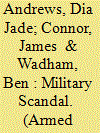

|
|
|
|
|
| Summary/Abstract |
Military scandals are disruptive episodes that can have long-lasting organizational consequences for military institutions. Recently, scholars who study military institutions have sought to understand this phenomenon and its significance. However, given their complexity and empirically opaque nature, military scandals are difficult to study, and a general account of this phenomenon has remained elusive. This article addresses this problem by drawing upon the growing field of scandal research to present a definition and account of the military scandal. We argue that military scandals are episodes of mediatized public moral conflict concerning transgressions involving the military institution, its members, and/or associated actors. We employ Ari Adut’s theory of public attention as a core explanation of scandal dynamics and effects and use this to argue that the military scandal phenomenon can be employed to simultaneously examine interactions and relationships between the military, the state, news media organizations, and civil society.
|
|
|
|
|
|
|
|
|
|
|
|
|
|
|
|
| 6 |
ID:
174837


|
|
|
|
|
| Summary/Abstract |
Despite efforts to improve women’s military representation, mid-career female officers attrit at twice the rate of male peers. Research and theory suggest women’s turnover is influenced by family life including marriage and parenthood. But previous research has grouped women together, failing to extrapolate which factors influence retention of women with different family types. Thus, this study explored a single career point (mid-career) at different family intersections (married, unmarried, with, and without children) to elucidate work and family factors associated with female officers’ retention decisions. Using 2011 Air Force survey data (n = 1,309), regression models tested four hypotheses regarding work and family factors associated with different subgroups’ military life satisfaction and career intentions. Findings indicate that after accounting for satisfaction, work factors were insignificant for all subgroups, but family factors (as hypothesized) were significantly associated with married women’s career intentions. Results suggest that policies targeting family support/satisfaction may improve retention.
|
|
|
|
|
|
|
|
|
|
|
|
|
|
|
|
| 7 |
ID:
174842
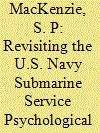

|
|
|
|
|
| Summary/Abstract |
Conclusions concerning how many World War II U.S. Navy submariners should be classified as psychiatric casualties have long been based on a pioneering study by two navy physicians, Commander Ivan Duff, MD, and Captain Charles Shilling, MD, that was first made public in the Journal of the American Psychiatric Association shortly after the war. This article seeks to show that, despite the longevity of the resulting published figures, there were serious problems in their approach and conclusions. The data set of the study was far from comprehensive, which, in turn, led to erroneous calculations generating a minuscule number—approximately two cases per 1,000 submariners—that in turn necessitated explanatory overreach. Reasons for the approach taken in the original work, and subsequent longevity of acceptance and celebration of the results produced, are then examined through the lens of confirmation bias.
|
|
|
|
|
|
|
|
|
|
|
|
|
|
|
|
| 8 |
ID:
174832
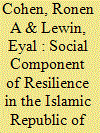

|
|
|
|
|
| Summary/Abstract |
This article examines the social components of national resilience as the source of the Islamic Republic of Iran’s ability to cope with possibly lethal blows and economic setbacks through four stages: (I) an account of the 1980–1988 Iran–Iraq War and the surprising outcome that left Iran undefeated, (II) a review of several theories that can aid us to analyze Iran’s national resilience ability, (III) an analysis of Iran’s wartime survival using the abovementioned theoretical infrastructure, (IV) a concise review of current issues in Iranian society which concludes with an evaluation of the state of Iran’s resilience regarding attacks on their nuclear program and its ramifications.
|
|
|
|
|
|
|
|
|
|
|
|
|
|
|
|
| 9 |
ID:
174835


|
|
|
|
|
| Summary/Abstract |
Motivation is a key factor for the military institution to accomplish its goals. Extant academic research, however, has generally focused on the combat motivation and the motivation to serve has been understudied. This study examines the motivation to serve and its predictors among Turkish military officers and NCOs. The aim of the current study is 2-fold: (1) to test the effectiveness of measures proposed by previous studies in Turkish Armed Forces and (2) to build on the existing body of knowledge by showing the impacts of perceived fairness and satisfaction with social benefits. Survey data, which were conducted only 2 months before the coup attempt in Turkey on July 15, 2016, were used to assess the motivation. Findings revealed that institutional and moral commitments, organizational responsiveness, perceived fairness, and satisfaction with social benefits were positive significant determinants of motivation to serve, while occupational commitment had a negative relationship with it.
|
|
|
|
|
|
|
|
|
|
|
|
|
|
|
|
| 10 |
ID:
174829


|
|
|
|
|
| Summary/Abstract |
Despite the importance of alliances in international politics, little is known about how they theoretically and empirically affect militarized conflicts and vice versa. This study aims to examine the reciprocal relationship between alliances and militarized conflicts. The literature has focused only on the effects of alliances on militarized conflicts without paying much attention to the simultaneous causation between them. Thus, previous studies have not consistently revealed a relationship between alliances and conflict. Moreover, they are limited due to the use of dichotomous measures of shared alliance ties. Using a continuous measure of alliance ties, this study clearly demonstrates that shared alliance ties can be effective in reducing the likelihood of militarized conflicts. In addition, this study finds that there is a reciprocal relationship between shared alliances and militarized conflicts. It finds that militarized conflicts tend to decrease the level of shared alliance ties. Then, this study argues that alliance might be added to the next element behind the Kantian tripod as a salient factor that reduces militarized conflict. Finally, this study points to insights to be gained from the findings and suggests some policy implications.
|
|
|
|
|
|
|
|
|
|
|
|
|
|
|
|
|
|
|
|
|